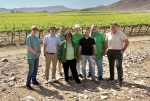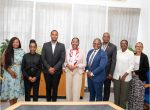With agriculture at the forefront of the Namibian economy and the welfare of its people, Bank Windhoek’s Executive Officer for Business Banking, Leon Koch, said Bank Windhoek has made agriculture a priority sector in its strategy. “We have launched various products to support this vital industry, including the Sustainability Loan, which has disbursed N$407 million in projects, with the majority allocated to agriculture,” he said.
Koch was speaking at Bank Windhoek’s fifth Agriculture Series held in Windhoek on Wednesday, 13 November 2024. The event was held under the theme ‘Cultivate Change: Strategies for a Resilient Agricultural Future.’
Speakers addressed topics such as the impact of drought on Namibia’s food basket, Dryland opportunities for Namibia, Low technology for emerging farmers and the use of conservation agriculture techniques for livestock and crop production.
Koch announced that Bank Windhoek has already geared its efforts towards assisting drought-affected customers through proactive engagement to identify mutually beneficial solutions.
He said this is in response to the determination on a policy issued by the Bank of Namibia in October 2024 regarding economic and financial stability challenges resulting from the persistent drought, which requires financial institutions to implement relief measures.
“As a relationship-driven bank, we recognise that our customers are the cornerstone of our success, and platforms like this reaffirm our commitment to building lasting relationships. Our membership to the Namibia Agriculture Union has enabled us to connect, participate, and entrench ourselves in the industry to enhance our understanding, add value and become thought leaders in this sector,” he said.
Acting Chief Veterinary Officer at the Ministry of Agriculture, Water and Land Reform, Johanness Shoopala delivered the keynote address on the impact of drought on Namibia’s Food Basket.
He said that despite agriculture’s importance, Namibia remains highly reliant on imports to meet local food demands, with up to 60% of food consumed in the country sourced externally. “Livestock mortality rates rise during drought periods, erasing years of investment for farmers and reducing national food supplies. The drought’s impact on crop production leads to a need for increased imports, making the country even more vulnerable to external market fluctuations and higher food prices,” he said.
Additionally, Shoopala said the reliance on imports poses significant risks, especially when drought conditions drive down local food production. “But with commitment, collaboration, and innovation, we can transform our agricultural practices not only to survive but thrive,” he said.
Bank Windhoek’s support to Namibian agriculture
Between 2023 and 2024, Bank Windhoek additionally spent approximately two million Namibian Dollars on various agricultural sector initiatives. Bank Windhoek’s Executive Officer for Marketing and Corporate Communication Services, Jacquiline Pack, said Bank Windhoek is proud to work with stakeholders in the agricultural industry while providing sustainable financial assistance to further develop the sector.
Apart from the Agriculture Series, the Bank supports events such as Communal Farmers Training, the Agra Weaner Championship Series, the National Youth Cattle Judging Competition, Namibia Agricultural Union and Livestock Producers’ Organisation livestock projects, the Windhoek Agricultural Show, and various small stock and cattle auctions.










